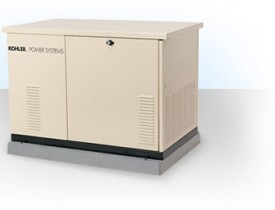Battery Backup Power vs. Gas Generators
 When the grid goes down, which type of system do you want for emergency power: battery or generator? Either type will get the job done -- as long as it's sized to cover your power needs -- but how quickly and for how long? Cost, installation, maintenance and safety are additional points that will influence the decision. Read more about these important factors below.
When the grid goes down, which type of system do you want for emergency power: battery or generator? Either type will get the job done -- as long as it's sized to cover your power needs -- but how quickly and for how long? Cost, installation, maintenance and safety are additional points that will influence the decision. Read more about these important factors below.
System Startup
A key advantage of battery backup power is the ability to start up within milliseconds. This means that computers and other electronic equipment won't shut down or reset when the grid fails. By contrast, even a super sophisticated gas generator with automatic startup can take 10 to 20 seconds to get things running again.
The most reliable backup source for computers is a UPS (uninterrupted power source), a special battery unit which remains plugged in to your equipment at all times. A UPS can be used in conjunction with standard battery and generator backup systems.
Storage and Operation
Another area where battery backup power surges ahead of gas generators is in its silent, emission-free operation. Also, battery systems are discreetly stored or installed inside the house, where they plug into any wall outlet for charging (when the grid is up, that is).
Gas generators of all types must be operated outdoors, due to their toxic exhaust, and they can be quite noisy -- particularly portable units. Gas generators also need a reserve supply of fuel, which requires outdoor storage as well as conditioning additives and/or periodic replacement of the fuel so the gas doesn't go bad while it sits.
Running Time
Here's where the scales tip toward gas generators for many homeowners. Since batteries can provide power for only so long before needing a recharge, they're most appropriate for short-term backup (anywhere from a few hours to a couple of days, depending on the system and your usage).
Gas generators will run as long as you need them to, provided you keep filling them with gas, and barring any mechanical breakdowns. Portable gas generators may need refills every few hours, while larger stationary units can run for days on large propane or diesel tanks or a natural gas hookup. The limited supply of battery backup power has prompted some homeowners to keep a gas generator on hand to recharge the battery system during long outages -- a backup for the backup!
How Much Juice Do You Need?
The best way to begin comparing battery backup power and gas-generated systems is to calculate your home's emergency electrical needs. Start by making a list of every appliance, fixture and device that you want to keep going in the event of an outage. On each item, look on the manufacturer's nameplate or stamp to find the wattage (watts) rating. If only the amperage (amps) is given, multiply the amp rating by 120 to find the wattage.
Note: For any appliances that use a motor (including refrigerators, furnaces and heat pumps, air conditioners, fans, etc.), you'll have to find the startup wattage and use it instead of the rated wattage on the nameplate (a.k.a. running wattage). Startup wattage is the amount of power it takes to get a resting motor up and running and can be several times higher than the running wattage.
Add up the total wattage of all the items, adding 10 to 20 percent as a safety margin. That's how much power your generator must provide to meet your needs.
Do the Math
Based on all these factors mentioned above, do some calculations and figure whether you're better off with a battery backup power or gas-powered backup. If you choose not to go the battery route, decide whether you're better off with a gasoline or diesel powered generator. Contact a licensed electrician for expert backup system installation.
Photo credit: Kohler
Looking for a Pro? Call us (866) 441-6648

Electrical Average Costs
Electricians Experiences

We Needed A New Bathroom Vent Fan To Get Our House Renter-Ready

Circuit Breaker Replacement For A K9 Facility



